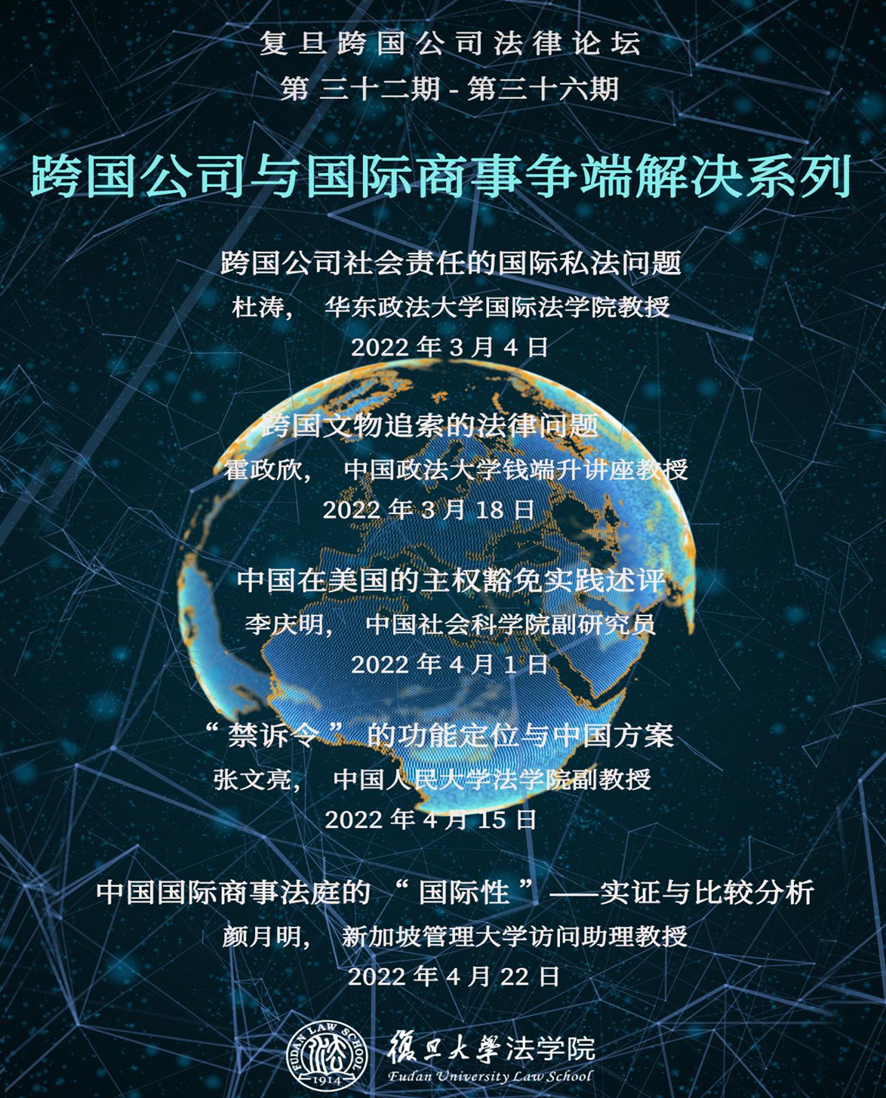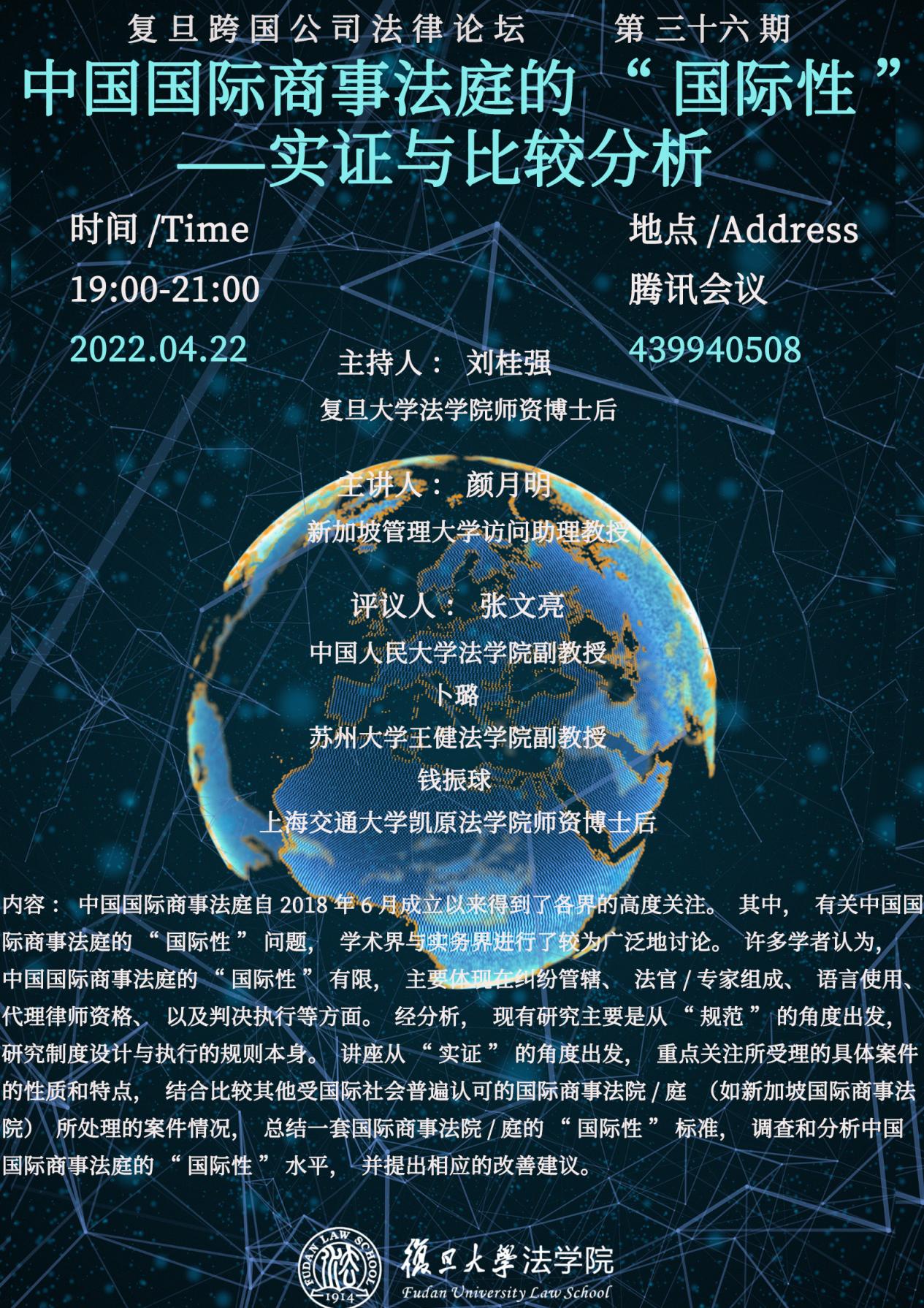

On April 22, 2022, the thirty-sixth keynote speech of the "Fudan Transnational Corporations and Law Forum" and the fifth episode of this Forum's special series of "TNCs and International Commercial Dispute Resolution" was held successfully online. The speech entitled "Is China International Commercial Court International? - An Empirical and Comparative Analysis" was delivered by Visiting Associate Professor YAN Yueming of Singapore University of Management, commented by Associate Professor BU Lu of Soochow University Kenneth Wang School of Law, Associate Professor ZHANG Wenliang of Renming University of China Law School, Postdoctoral Researcher QIAN Zhenqiu of Shanghai Jiaotong University Koguan School of Law, and hosted by Postdoctoral Teaching Fellow Dr. LIU Guiqiang of Fudan University Law School.
In recent years, many countries have established international commercial courts within their judicial systems. Dr. YAN studied whether China International Commercial Court (CICC) is international, what is the standard of internationalization and why the degree of internationalization matters? Dr. YAN used the International Courts and Tribunals (ICTs) and international arbitral tribunal as the respective reference standards to ascertain the criteria of internationalization under public international law and private international law. She pointed out that the "supernational" character of the ICTs makes them "international," which is usually realized through sovereign concessions made by states in treaties. Meanwhile, the function of international arbitral bodies is to provide a well-developed dispute resolution system for "transnational" civil and commercial disputes. Dr. YAN further compared international commercial courts with domestic courts, which also resolve disputes involving international elements. Dr. YAN categorized international commercial courts into three categories according to their purposes and objectives: market-driven, user-driven, and policy-driven.
Dr. YAN analyzed two institutional issues of the international commercial courts: jurisdiction and the composition of judges. While the mainstream view holds that the jurisdiction of international commercial courts in most cases is conferred mainly by agreements, CICC has been criticized by scholars for attaching an additional requirement to establish an actual connection with China. However, the gap in the case count between CICC and the Singapore International Commercial Court (SICC) and the Dutch International Commercial Court (NCC), which are widely accepted as "international" courts, is not obvious. Dr. YAN's empirical research demonstrated that SICC and NCC had heard very few cases with no connection with the forum state. It is noteworthy that most of the cases heard by SICC are transferred from the Singapore High Court. Dr. YAN came up with the following question: Is the principle of actual connection so important? Is internationalization reflected at the level of rules or the practical level?
The second institutional issue is the composition of judges. The criteria for an eligible judge are independence, impartiality, and profession. Through empirical research, Dr. YAN found that NCC does not have foreign judges, and SICC only has a small number of foreign judges. CICC does not permit a single judge to hear the case. In contrast, most of the cases filed before SICC and NCC are heard by a single judge. What followed is Dr. YAN's question about the independence and impartiality of local judges or single judges hearing these cases and whether a single judge and foreign judge can ensure the professionalism of decisions.
Subsequently, Dr. YAN analyzed the procedural challenges confronting international commercial courts in CICC, SICC, and NCC, including the applicable law, individual opinions of judges, language, and technology.
Dr. YAN concluded that although SICC and NCC appear to be more international, their degree of internationalization is limited from an empirical point of view. Although CICC demands further improvement in many perspectives, CICC certainly has demonstrated a certain degree of internationalization from the perspective of its purpose, its professionalism in dealing with international commercial disputes, and its contributing role in creating an international rule of law environment.
In the discussion session, Professor BU spoke highly of Dr. YAN's empirical research. She suggested that more attention should be paid to the role of CICC in guiding lowers courts in hearing foreign-related cases. Professor ZHANG underlined the decisive influence of selecting criteria and subjects in evaluating the "internationalization" of international commercial courts. He further suggested using the effectiveness of international commercial courts, international evaluation, and the degree of international acceptance by private parties as the criteria for evaluating international commercial courts' internationalization. Dr. QIAN pointed out that the actual connection requirement remained an obstacle for CICC to hear international cases. He mentioned that CICC had taken many measures to improve its degree of internalization, such as establishing expert committees and a one-stop dispute resolution mechanism. He also considered that the documents released by CICC had become an important channel for China to express its attitude towards international adjudication and participate in international law-making.
On May 6, 2022, the Forum will host the thirty-seventh keynote speech entitled "Home Country Litigation against Multinational Corporations for Overseas Infringements" by WANG Xiumei, Professor of Northwest University Law School.






